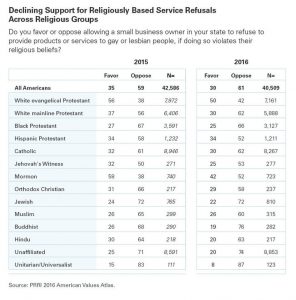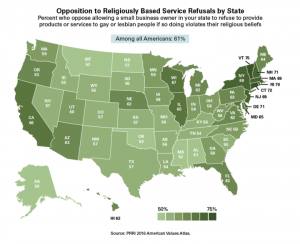According to a new report by the Public Religion Research Institute, fewer Americans support religious-based discrimination than before. The study was based on forty thousand interviews, and showed that about 60% of Americans were opposed to companies refusing service on religious grounds, for example, if the customer is gay and the company owner thinks that is a sin. While this is approximately the same percentage as they found in a similar report last year, the break down has changed between religious groups.

White Evangelical Protestants still overall support the idea, but by a smaller margin now. In 2015, 56% supported religious-based discrimination, but in 2016, only 50% did, with about 8% choosing not to respond. White Mainline Protestants, including Episcopalians, have seen opposition to the discrimination rise from 56% to 62%.
The poll focused on treatment of LGBTQI+ people, such as in the famous case when the baker refused to make a wedding cake for a gay couple. “For the first time in a PRRI poll of this size, no major religious group reports majority support for religiously based service refusals of gay and lesbian Americans,” said PRRI CEO Robert P. Jones in a statement.
The PRRI also broke the results down by state, showing that in every state but Alaska, a majority opposed religious-based discrimination, with an average of 61% in opposition.

Support for such refusals is declining across the political spectrum as well, despite the continued introduction of bills such as the new law in Texas that allows faith-based adoption services to refuse adoption “under circumstances that conflict with the provider’s sincerely held religious beliefs.” And yet, even though such bills are mostly put forward and supported by Republicans, their party saw one of the greatest drops in the belief that religious-based discrimination should be legal.


